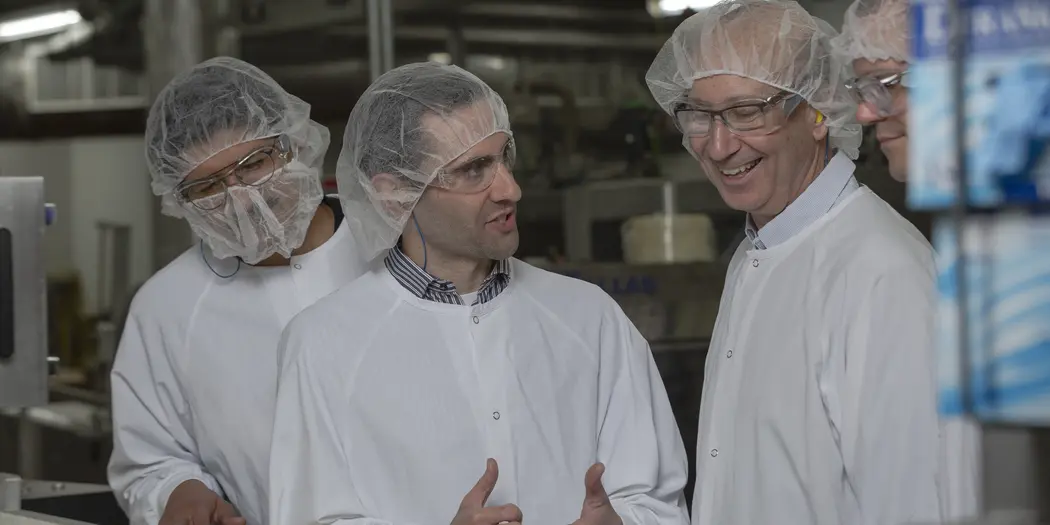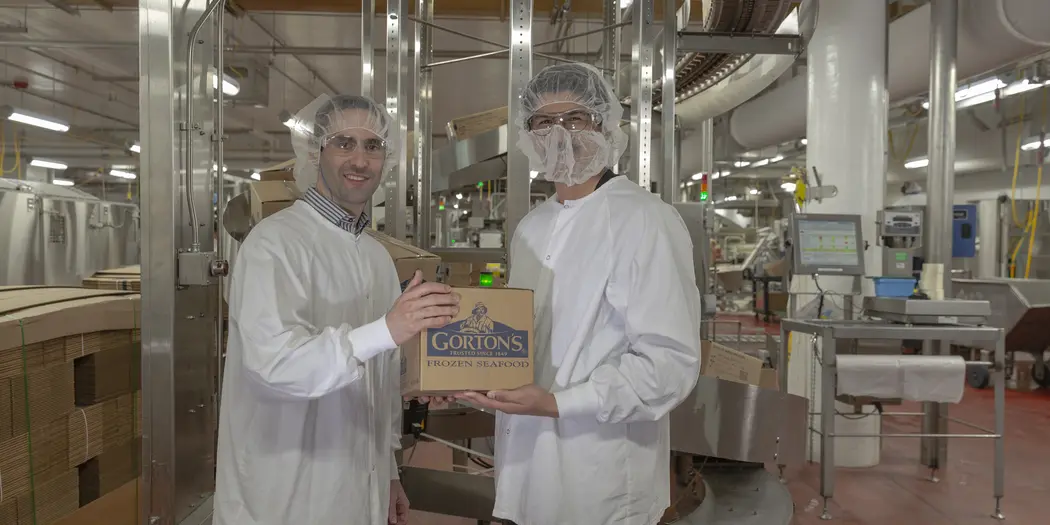Action Learning
HOST SPOTLIGHT: Why Action Learning Hosts Return Year After Year
Action Learning students work with host Jeff Whiteacre at Gorton's of Gloucester in Massachusetts for the onsite portion of Operations Lab.
Credit: Nicholas Briggs
Strategic insights keep Action Learning host companies coming back for more
What does Gorton’s of Gloucester, a 170-year-old Massachusetts seafood company, have in common with technology startup Gojek, Indonesia’s first unicorn? And what do both have in common with Paytm, a company focused on revolutionizing India’s financial services industry?
All are among the companies that repeatedly turn to student teams from the MIT Sloan School of Management’s Action Learning labs to address a wide range of challenges—from assessing new business models to developing new products and expanding into global markets. MIT provides a deep well of talented students who, through the lens of Sloan’s Action Learning pedagogy, work with companies such as Gorton’s, Gojek, and Paytm. These and other organizations return year after year requesting a student team to work on their business challenges—with advice from faculty and expert mentors. Thus, leaders say, Action Learning ensures companies get reliable support in their efforts to scale up, strengthen operations, or innovate.
“[The students are] professional and disciplined enough to do the work we could do, but we don’t have time to do. They give us strategic insights,” says Antoine de Carbonnel, chief commercial officer at Gojek, which has worked with teams from Global Entrepreneurship Lab (G-Lab) over several years. “I’ve only had good experiences.”
Each year, MIT Sloan offers 15 to 20 Action Learning labs—courses that give students the opportunity to apply classroom learning to real-life challenges. While some—including China Lab, Israel Lab, and USA Lab—focus on a particular region, others center on certain industries or disciplines, such as finance, healthcare, sustainability, or data analytics.
In all cases, students pair coursework with a hands-on project developed for and with a host company. They perform a wide range of research-intensive tasks, from benchmarking best practices to analyzing stakeholder needs, and from researching new markets to comparing inventory tracking systems. Students work closely with their host organizations, and each Action Learning lab provides expert faculty guidance to help teams troubleshoot problems and brainstorm ideas.
“Our teams can help bring global insights to host organizations,” says Senior Lecturer Shari Loessberg, who sources G-Lab projects at early stage international companies and serves as a team mentor for G-Lab students.
Fresh Perspective
Since 1999, when MIT Sloan formally launched Action Learning courses, more than 1,300 organizations have benefited from the work of MIT students. But Gorton’s, Gojek, and Paytm are among a growing number that keep coming back with new projects. Why?
Scott Keating, a recently retired MIT senior lecturer and long-time Action Learning mentor who has served as the mentor for nine India Lab teams working with Paytm, says, “We continue to deliver bright students that think out of the box and can provide a fresh perspective on the issues leaders are dealing with on a day-to-day basis.”
Paytm was “a fledgling little business; it hadn’t succeeded yet” when the company first partnered with MIT Sloan Action Learning, according to Keating. Thanks to India Lab, students got the chance to participate in an exciting period of growth.
Notably, in 2015, Paytm asked India Lab students for help developing a strategy for attracting small offline merchants to accept payment through its mobile application. Within a year, Paytm began implementing the team's recommendations—reaching out to local merchants to persuade them to accept mobile payments via Paytm. The launch was extraordinarily successful: Following the demonetization of large banknotes in India in November 2016, Paytm was able to sign up new merchants at a rate of 100,000 per week by March 2017.
“What's remarkable is not any particular project but that almost every project we've worked on has been commercialized,” Keating says, noting that Paytm’s parent company is now estimated to be worth at least $10 billion.
Data-driven Insights
At Gojek, de Carbonnel says Action Learning teams have supported several important business decisions by providing leaders with a wealth of data and analysis. “We’ve found G-Lab teams are quite quantitative in their approach, and we’ve always believed having numbers is a critical building block to any strategy.”
Founded in 2010 as a ride-hailing service, Gojek has ballooned into a multibillion-dollar technology company on track to dominate the on-demand economy of Indonesia. G-Lab teams have supported that trajectory, de Carbonnel says.
For example, in 2017 a G-Lab team helped Gojek explore its options for developing a mobile point-of-sale service. The students’ analysis helped support the company’s decision to acquire a digital cash register that has now become the largest such service in Indonesia—used by 9,000 merchants.
Ops-Lab students at Gorton's of Gloucester in Massachusetts.
Credit: Nicholas Briggs
Drivers of Change
Gorton’s is another host that has returned to work with MIT Sloan Action Learning teams year after year. According to Jeff Whiteacre, the continuous improvement, lean champion at Gorton’s, the company has been turning to Action Learning teams—including Operations Lab (Ops-Lab)—for about a decade, because the students continually provide actionable recommendations and tools that the company can use to improve both efficiency and sustainability, two of its key business goals.
“MIT student projects have been so helpful,” says Whiteacre. “We use them a lot for validation of our thinking because they can bring in data analysis that we might not have.”
Returning to MIT time and again makes it possible for student projects to build on one another, Whiteacre notes. In 2016, for example, an MIT Ops-Lab team used data mining and statistical analysis to identify ways to enhance the company’s seafood production process. That team’s recommendations helped the company reduce "trim loss," the loss of some portion of edible fish that occurs during production. The success of this project was made possible by the work of earlier teams, which had identified where optimization might do the most good.
Over the years, Whiteacre says, Action Learning teams have helped Gorton’s with tasks ranging from reducing handling costs to optimizing inventory levels, ultimately laying the groundwork for a significant transformation of the company to a leaner, more sustainable operation. “We’ve done a lot of interesting things. Students gave us ideas of how we use everything, what needed to be done to change manufacturing to not have waste.”
Most recently, Ops-Lab teams helped Gorton’s address the challenge of meeting new customer demands. By identifying ways Gorton’s could reconfigure its Gloucester plant to support a wider variety of products, the students have helped the company stay competitive in the fast-moving food market, Whiteacre says. “This partnership gives Gorton’s a competitive advantage…. We love working with MIT.”
While the specifics of the projects differ—from company to company and from year to year—ultimately hosts agree they return to Action Learning again and again because the partnership brings extra brainpower to help drive innovation, and the student teams offer new approaches to business challenges, demonstrating MIT’s commitment to teaching students in a manner that enables them to contextualize their learning. “When you are stuck to your knitting and focused on your market, you’re kind of blind,” de Carbonnel says. “So, having somebody who has the time to [help] … is very useful.”
The result, as Keating says, is often “an incredible parallel between projects and overall business expansion.”


